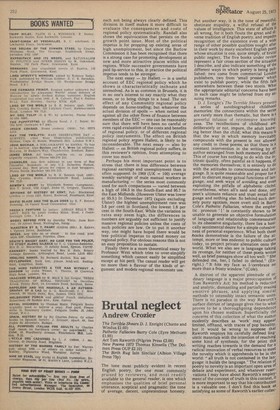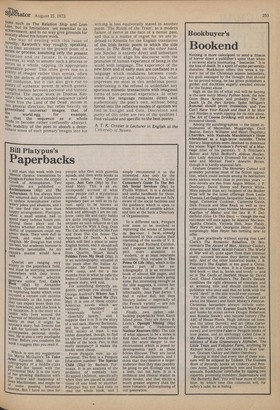Brutal neglect
Andrew Crozier
The Terrible Shears D. J. Enright (Chatto and Windus £1.60) Pathetic Fallacies Barry Cole (Eyre Methuen £1.95) Act Tom Raworth (Pilgrim Press £2.00) New Poems 1973 Thomas Kinsella (The Dolmen Press OUP £2.10) The Birth Rug lain Sinclair (Albion Village Press 75p) The tone most publicly evident in recent English poetry, the one most commonly praised by reviewers, and most readily available to the general reader, is one which emphasises the qualities of brief personal utterance, sceptical and pragmatic: the tone of average, decent, unpretentious honesty.
Put another way, it is the tone of resentful, obstinate stupidity, a wilful refusal of the values of intelligence. This state of affairs ts all wrong, for it both flouts the great and di' verse tradition of English poetry, and impedes recognition of the existence even of a wide range of other possible qualities sought after in their work by many excellent English poets whose situation is one, quite simply, of brutal public neglect. The five books under revieW represent a fair cross-section of the situation I describe, and also indicate something of the different ways in which poetry is being Pah' lished: two come from commercial London publishers, two from 'small presses' which exist to publish poetry, while the fifth falls somewhere between these two stools. What the appropriate editorial concerns have been in each case might be inferred from my en' suing remarks.
D. J. Enright's The Terrible Shears presents a series of autobiographical childhood Memories: the connections within the series are rarely more than thematic, but there is a powerful infusion of retrotensive knowing ness. The recollections of childhood are; deliberately or not, impure, the adult kneeling better than the child; what this means is that the way in which memory inevitablY compounds with the present is not. allowed any credit in these poems, so that there is a constant intervention in the writing by 01,11 author estranged from both memory and self. This of course has nothing to do with the in; trinsic quality, often painful as it happens, 01 the memories themselves; it is entirely to do with the attitudes to consciousness and language. It is quite reasonable and proper for It poet to distrust many actual functions of language, and seek ways of avoiding and even exploiting the pitfalls of alphabetic cliche; nevertheless, when all's said and done, anY poet's ultimate reliance and trust entail language and nothing else. So behind such densely puny egotism, more overt still in Barry Cole's Pathetic Fallacies, where the emphatic pronoun I' is constantly shown to be unable to generate an objective formulation of language and relationship commensurate to its obsessive singularity, there lies a basi. cally sentimental desire for a simple cohesive' ness of personal experience. What both these books demonstrate is the failure of the attempt, more or less endemic to public culture today, to project private alienation onto the world. What we also see is language taking its revenge, for neither of these poets writes well, as brief passages show all too well: "She defended me, her. I failed to defend." (En' right.) "It hits my face as 1/cerebrate no more than a frosty window." (Cole).
A distrust of the apparent plenitude of or; dinary language is a major preoccupation nt Tom Raworth's Act; his method is reductive and analytic, dismantling and partially erasing emotive phrases, and applying similar methods to ostensibly intact semantic units. There is no paradox in the way Raworth's surface distrust of language gives rise to what proves to be a thoroughgoing dependence upon his chosen medium. Superficially the concerns of this collection of what the author modestly describes as 'work' may appear limited, offhand, with traces of pop banality; but it would be wrong to suppose that Raworth employs his carefully defined linguistic materials with the intention of reachin$ some kind of synthesis, for the point this writing reaches towards is the demand for a radical innovation of verbal resources to meet the novelty which it apprehends to be in the world: "all truth is not contained in the Ian' guage: it builds the language." The relation of, poetry to novelty is an important' open area or debate and experiment, and whatever reservations I may have about Raworth's emploY' ' ment of the concept of truth in this context, it is more important to say that his contribution is a valuable one. I don't find this book as satisfying as some of Raworth's earlier collec dons Such as The Relation Ship and Lion Lion., but its limitations are essential to its achievement, and in no way give grounds for anxiety about his future work. One way of dealing with this issue of ,n. OVeity, Raworth's way roughly speaking, is to limit attention to the growth point of a series or process, assuming only the present situation and its future, It is possible, how. ever, to wish to assume such a process or series as a whole, tapping its appropriate generative power. This often gives rise to a Poetry of images rather than syntax, often with the defects of primitivism and Intellectual confusion, but it can also give rise .to Poetry of authentic power, in which genetic images mediate between personal and historic narrative, The major work in Thomas Kinselia's new book, an extended sequence called 'Notes fron the Land of the Dead', moves in this general direction, but relies heavily on generalised universal images, that of the world-egg for example, so that the sequence as a whole tends to become rather confusedly abstract, The inability of the poet to absorb a determinate sense of such primary'images into his writing is less equivocally stated in another 'poem, The Route of the Train', as a modern failure of nerve in the face of a heroic past, and this is a matter of regret for we are indebted to Kinsella for the English translation of the Irish heroic poem to which the title refers. In The Birth Rug, on the other hand, lain Sinclair is entirely direct and unhesitant in his need to align his discourse with the primaries of human experience of being in the world with language. The experience of the new born and of early man are conflated in a language which modulates between conditions of privacy and objectivity, but what impresses me most in this ambitious poetic undertaking is the refusal to undertake any spurious mimetic transactions with imagined forms of non-personal experience. In other words the . language remains direct and authentically the poet's own, without being forced into the reflexive modes of egotism we find in Enright and Cole, Discretion and purity of this order are two of the qualities I find valuable and specific to the best poetry.
A. T. K. Crozier is Lecturer in English at the University of Sussex.



































 Previous page
Previous page